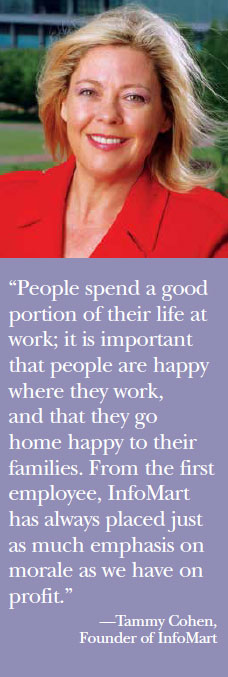

It is often said that a company is only as good as its employees, and with the economy on the mend, business owners are selecting who works for them more carefully than ever. U.S. News and World Report wrote in January that our national economy appears to be poised for its best performance since the recession hit in 2008, saying it has largely mended. Fiscal and regulatory drag is diminishing, deleveraging is in the past and by the fiscal year 2015, the U.S. government is expected to have achieved a fully balanced, operating budget.
In this time of healing it’s imperative that companies keep outperforming the previous years, and happy employees will be a big part of that success. High employee morale can potentially boost revenue and reduce expenses—both serve to increase profitability. “Morale touches everything an employee or team does,” says Andy Crowe, founder and CEO of Velociteach in Kennesaw. “There is a direct correlation between morale and productivity. With the employment challenges in the economy over the past several years, many companies have neglected their employees, and now that things are heating up again, employees with low morale are changing jobs in droves. It is so much better to improve morale (and productivity along with it) than it is to lose employees and have to start over.”
The Makings of a Happy Employee
 High productivity, a direct result of higher morale, is a competitive advantage, one that companies should strive not only to maintain but increase. One of the oldest and largest background check companies in the country, InfoMart, employs 100 people and 120 in its peak seasons. Founder Tammy Cohen recalls working for employers that didn’t recognize or support their workforce emotionally. “People spend a good portion of their life at work; it is important that people are happy where they work, and that they go home happy to their families,” she says. “From the first employee, InfoMart has always placed just as much emphasis on morale as we have on profit.” Cohen says that investing in morale has a high return on investment.
High productivity, a direct result of higher morale, is a competitive advantage, one that companies should strive not only to maintain but increase. One of the oldest and largest background check companies in the country, InfoMart, employs 100 people and 120 in its peak seasons. Founder Tammy Cohen recalls working for employers that didn’t recognize or support their workforce emotionally. “People spend a good portion of their life at work; it is important that people are happy where they work, and that they go home happy to their families,” she says. “From the first employee, InfoMart has always placed just as much emphasis on morale as we have on profit.” Cohen says that investing in morale has a high return on investment.
Velociteach is a small business with 25 employees and a global footprint. A leader in the project management education business, Crowe’s team trains individuals and businesses alike in more than 100 countries. Achieving Cobb County’s 2012 Small Business of the Year award and ranking on the U.S. Chamber of Commerce’s 2013 Top 100 Small Businesses in the U.S.A., Velociteach helps companies learn to plan, execute, monitor and manage their products more effectively. It’s no small task for this small team. With June being Effective Communications Month and National Smile Month—two areas that greatly affect the workplace—Crowe has some unique initiatives and practices in place to keep up morale in his own company, and it often starts with careful hiring. “When someone has a phone interview, one of the questions on our form is whether or not you can ‘hear their smile’ over the phone,” he explains. “We spend an inordinate amount of time trying to select people with the right personality for the organization. Positive attitudes are contagious, but negative ones can be as well.” They also make an effort to catch people doing things right instead of just correcting mistakes.
For Kim Ellet, who oversees Cobb County in the metro Atlanta branch of The Growth Coach, employee loyalty can be just as important as customer loyalty. The Growth Coach was ranked No. 1 by Entrepreneur magazine in 2013 for business and sales coaching. “We all know how great it feels to interact with an employee or business owner that clearly cares about the customer and will go the extra mile. If employees truly enjoy their job and are dedicated to serving their clients, it will show in the day-to-day interaction with both customers and fellow employees, and most certainly on the bottom-line,” Ellet says. “In addition to affecting sales, positive employee morale also affects marketing. In today’s world of instant reviews and word-of-mouth marketing, customers are swayed by the experiences of others, so it makes a big difference if happy employees are taking care of business.”
When it comes to what makes a happy employee, Crowe believes it is a constructive mix of some very important accomplishments. “We have actually done a lot of research in this area, and I believe it comes down to three basic areas: control over how they do their job, developing skill at their work and making a difference,” he says. “If these three are present, you have the ingredients for real happiness and success.”
Above and Beyond
Feeling valued, respected and able to follow productive avenues of change are some of the many elements that can take employee morale to the next level. “Ideally, business owners create the culture of open communication within their teams. Working with a coach for business and life is also a terrific resource to prevent and tackle issues that arise,” Ellet says. “It is very comforting for folks to realize they are not alone in some of the challenges they may face and that they can also provide support and insight to their peers.”
Cohen remembers her father saying, “Don’t hit my something with your nothing,” and relays this message to her employees—meaning that if someone has an idea for improvement and you don’t like or agree with it, you have to come up with something better before offering your opinion. InfoMart begins the day with a company-wide chant and the daily intranet posts announcements, tips and the productivity from the previous day. Each employee is aware of productivity issues and needs as they occur. The “IM InfoMart” program includes committees such as IM Fit, IM Giving, IM Growing and IM Celebrating that are chaired by employees to ensure that employee needs are always being addressed.
Crowe has an open-door policy in his business, but says that alone is not enough. “Employees need to know that their managers and co-workers really care about them as human beings and not just as human resources,” he explains. “I think that our greatest asset is that we really do value our employees, and I believe they value Velociteach as an employer.”
It is always a good time to look around your workplace and reevaluate how morale is affecting not just your day-to-day, but the future of the company. “The foundation of happiness is constant recognition, respect, security and empowerment,” Cohen advises. “Add laughter and activities that fulfill personal interests and you have not only happy employees but a very committed and productive workplace.”
















